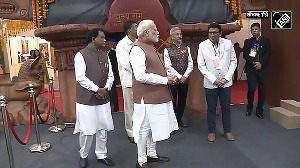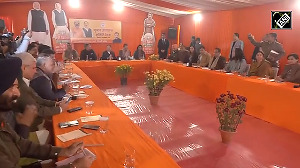'Price competition is fierce, with many companies selling at zero margin.'
'This pricing pressure is challenging smaller companies and will likely drive some out of the market over time.'

Even as the Indian electric vehicle (EV) segment is affected by issues like drastic reduction in government subsidies, customer complaints against a major two wheeler player, absence of charging infrastructure network and others, the two and three wheeler segments are getting good traction, said top officials of two manufacturers.
One of them is looking at the African markets for Made in India EV three wheelers.
They also said the sector is becoming a challenge for the new entrants and consolidation would happen not by mergers and acquisitions but by closure/exits.
"The B2B (business-to-business) segment of the EV market is experiencing significant growth," says Anirudh Ravi Narayanan, CEO and Co-Founder, Bharat New-Energy Company. "Currently, I estimate that about 10% of overall EV sales are attributed to B2B applications, indicating a robust market demand."
"Many small business owners are now showing interest in electric two-wheelers as they look for cost-effective transportation solutions for their operations," Narayanan added.
His company rolls out EV motor bikes with various accessories for carrying goods and is planning to come out with a premium scooter by the end of this year.

In the past, the B2B segment was the leading market for electric two-wheelers in India. However, it saw a decline when many logistics companies turned to low-cost Chinese vehicles, which ultimately broke down. This left numerous companies with fleets of non-operational vehicles.
"Currently, we are witnessing a resurgence in the B2B segment, with businesses once again exploring electric two-wheelers as viable options. The landscape is shifting, and companies are becoming more receptive to investing in reliable electric vehicles," says Narayanan.
According to him, for small business operators like delivery personnel covering about 120 km per day, the switch to an EV two wheeler can result in a saving of Rs 7,000 on fuel cost alone.
"Our current focus is on three wheelers as the adoption is more. In the two wheeler segment there is a price war. Traditional two wheeler companies like TVS Motor, Hero and Bajaj Auto have created a basic market. We can't burn money. Government subsidy will be only for two years and post that it is doubtful," says Ayush Lohia, CEO, Lohia Auto Industries Ltd.
According to Lohia, in the EV three wheeler segment buyers are moving towards high powered vehicles from electric rickshaws.
"In the EV three wheeler segment no new player is coming in while many e-rickshaw players are going out. We expect good volume growth in the L5 (high powered vehicles like the traditional three wheelers) segment. When the penetration increases in the southern markets, the overall numbers will grow fast," predicts Lohia.
Lohia Auto plans a premium vehicle in the L5 segment.
"We are also exploring overseas markets for exports. We are looking for associates in the African markets," says Lohia.

The cut in government subsidies, increased competition resulting in pricing pressures are the major restrictions faced by EV manufacturers.
"In terms of industry subsidies, the current incentive (for EV two wheelers) has been set at Rs 10,000, a significant reduction from previous levels," explains Narayanan.
"Two years ago, in 2022, the subsidy was Rs 40,000. It was subsequently lowered to approximately Rs 20,000 and then to Rs 10,000," adds Narayanan.
"For the coming year, it is expected to decrease further to Rs 5,000," says Narayanan. "This reduction will impact pricing, with our scooter projected to be priced at Rs 109,000."
Going forward, Narayanan says Bharat New-Energy Company will aim to capture the EV market share in the B2B segment, focusing on the light commercial vehicles-Tata Ace segment.
"To support our growth, we have raised Rs 200 crore (Rs 2 billion), with plans to raise an additional Rs 300 crore (Rs 3 billion) in the next six months. These funds will help us expand our distribution network and increase our supply chain capacity to 15,000 vehicles per month," says Narayanan.
"We have seen significant fluctuations in market share recently," informs Narayanan. "These month-to-month fluctuations can be as high as 10 percentage points, primarily driven by aggressive pricing strategies."
While larger companies like Bajaj have seen relatively stable month-to-month sales, Ola Electric sales figures have experienced substantial swings.
For instance, from July to last month, Ola Electric's sales dropped from around 42,000 to 25,000 units, as per the figures put out by the industry body Society of Manufacturers of Electric Vehicles.
"Price competition is fierce, with many companies selling at zero margin," says Narayanan. "This pricing pressure is challenging smaller companies and will likely drive some out of the market over time."
Feature Presentation: Rajesh Alva/Rediff.com











 © 2025 Rediff.com -
© 2025 Rediff.com -